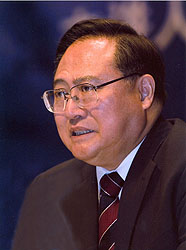|
 |
|
Xiong Guangkai, Chairman of the China Institute for International Strategic Studies and former Deputy Chief of the General Staff of the People's Liberation Army (COURTESY OF XIONG GUANGKAI) |
Xiong Guangkai's International Situation and Security Strategy was published in Chinese by the Junshi Yiwen Press and in English by the Foreign Languages Press in March, catching the attention of researchers on international strategic studies and military affairs at home and abroad. Xiong, former Deputy Chief of the General Staff of the People's Liberation Army (PLA), currently heads the China Institute for International Strategic Studies.
The book's English edition was edited by Lin Wusun, former President of the China International Publishing Group. It aims to introduce China's national security strategy to interested readers around the world. In a book review for Beijing Review, Sa Benwang and Wang Wei, researchers with the China Institute for International Strategic Studies, speak highly of Xiong's academic achievements as a scholar and his devotion as a retired army general.
Before his retirement, General Xiong Guangkai worked for the Chinese military for more than 50 years, during which time he took part in top-level policy making of the state and the military as a senior advisor. Xiong, who has traveled around the globe, is also an active person devoted to foreign exchanges. His distinguished professional background, deep strategic insight and legendary personal experiences have made International Situation and Security Strategy an extraordinary work.
The book, consisting of 27 essays, speeches and reports the author published from 2000 to 2009, is a comprehensive and systematic summary of his reflections on the international situation and security strategy in recent years. In the book, Xiong summarizes the evolution of the international situation since the beginning of the 21st century. He not only analyzes China's security environment from an overall perspective, but also analyzes major strategic problems in China's security strategy and the modernization of its national defense. At the same time, he conducts useful research into China's international strategic deployment, the adoption of its security strategy, the development of its security concept and its military reform. With insightful analyses, convincing arguments and vivid narration, International Situation and Security Strategy is an excellent book that integrates history with current affairs, strategy with policy and theory with practice. It is a culmination of the author's efforts to study strategic issues over the past decades. His expertise on international strategic studies and national security is undoubtedly of great value to other researchers specializing in these fields. Its English edition opens the door to a better understanding of China's national security strategy for researchers on strategic issues throughout the world.
Xiong's book consists of four sections, "International Strategic Situation: Retrospect and Prospect," "National Security Strategy and Policy," "International Relations and Foreign Policies" and "Military Diplomacy and Building." The first section is a collection of the interviews and speeches the author gave either at the beginning or the end of each year since 2000. In these articles, Xiong reviews the international situation of the past year and looks ahead to the coming year. The Chinese have always cherished this belief: "Those who fail to consider long-term interests are unable to make short-term achievements; those who fail to look at the overall situation are unable to make a difference in a single area." Accurately judging the international situation and monitoring changes as they develop is a major strategic issue bearing on China's security, development and domestic and foreign policies.
"In order to have a correct understanding and judgment of the strategic situation in the world and in China's surrounding regions, we need to have the deep vision necessary for gaining insight into the main themes of our times as well as the world's economic, political, military, scientific and technological developments," Xiong writes. "At the same time, we should view it from a historical perspective of the rise and great rejuvenation of the Chinese nation. In reality, some comrades are easily misled by superficial phenomena. They often see only the parts but not the whole, are concerned only with the present but not the future, regard a part as the whole, and attend to trifles while neglecting the essentials. This could be very detrimental to our cause."
The international situation has undergone profound and complicated changes since the beginning of the 21st century. Major events such as the September 11 terrorist attacks in 2001, the emergence of the "Bush doctrine," the war in Iraq, the North Korean nuclear crisis, the armed conflict between Russia and Georgia, and the international financial crisis have deeply influenced the international strategic situation. They have also sparked heated debate on the international situation and China's foreign policy in relevant departments, the academic community and the general public. If you read Xiong's annual international situation reviews while bearing in mind the context in which they were published, you will gain a better understanding of the author's viewpoints and arguments. The author takes the trend of the times and overall strategic situation into consideration when he analyzes the changes in the international situation at a certain stage.
|
